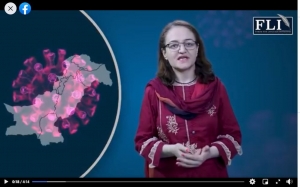FLI partnered with Anjuman Taraqqi Khowar (ATK) in organizing the 4th International Hindukush Cultural Conference from September 14 to 16 in Chitral town of Khyber Pakhtunkhwa province. A total of 75 research papers out of 85 originally submitted, covering the Hindukush region were presented in the mega event. The presenters came from across the world including those who participated as keynote speakers. Six keynote speeches were delivered. Those who could not participate physically were facilitated to present their papers digitally in the form of a recorded presentation, the presenters subsequently made themselves available for answering the following questions at the end of their presentation. The sessions of the three day conference were strewn among four rooms allowing the attendees to choose their seating of interest. More than 200 people registered to participate in the conference. The main hall carried 200 chairs which hosted all keynote speeches to begin the day. The participants then would disperse to other rooms to attend sessions of their interest.
The 4th International Hindukush Cultural Conference was an academic and scholarly activity in continuation of the first conference held in Moesgaard, Denmark in 1970. The 2022 conference commemorated the golden jubilee of that first conference. The 2nd International Hindukush Cultural Conference was hosted by the Anjuman in Chitral, in August 1990 with Professor Israruddin (Chairman, Department of Geography, University of Peshawar) as convener and Dr Karl Jettmar (South Asian Institute, University of Heidelberg, Germany) as general president. The 3rd conference was hosted by the same organization in Chitral in October 1995, with the same convener and Professor Schuyler Jones (Pitt Rivers Museum, England) as General President. The 4th International Conference was convened by Professor Israruddin to give an opportunity for high profile scholars in the field of Hindukush studies to meet and exchange ideas about their recent works. The conference brought together national and international scholars.
The conference was to be organized as planned in 2020 which could not be materialized due to Covid-19 pandemic. The event again got postponed the following year on the same grounds. Eventually, in the current year of 2022, the organizers had the confidence to dare organize the conference seeing the normalization after the pandemic. Holding the event on professional footings from planning to execution was a challenge in this part of the world. From identification of reviewers of the papers to the spotting of the venue was also a challenge the organizers embraced in the process.
The thematic areas, the organizers pondered upon to select, included mostly from the previous editions like history, geography, culture, Kalasha heritage, languages and tourism but one more added this time was MTB-MLE, referring to the Mother Tongue Based Multilingual Education. The objective of the conference was to provide a platform to researchers, students and professionals from the development sector for discussing the social and economic issues and finding solutions through interaction, knowledge sharing and networking.
Internationally practiced methods were adopted to organize the event beginning from using Event-Management-Software for submission of papers, reviewing them through peer system and blind reviewing. The venue, selected was a peaceful setting of the Public Library Chitral in the central location of the Chitral town.
The six keynote speeches were delivered. Dr. Elena Bashir who travelled for the event from Chicago was the president of the conference who also delivered the keynote speech. Since 1973, Elena has been visiting Chitral regularly, first bringing students on field trips, then working on her doctoral dissertation on the Kalasha language, completed in 1988. She has also done field work on other indigenous languages of Pakistan, including Wakhi, Burushaski, Shina, Balti, and Balochi, about which she has published several articles. She has two books on languages of Pakistan: The Languages and Linguistics of South Asia, edited by Hans Henrich Hock and Elena Bashir, and A Descriptive Grammar of Hindko, Panjabi, and Saraiki, by Elena Bashir and Thomas J. Conners.
The next keynote was delivered by Dr. Alberto Cacopardo who is adjunct professor of anthropology at the University of Florence, Italy. He has carried out ethnographic research on various populations of Chitral and neighboring areas over a span of several decades, starting in 1973. He has published various books and articles on the subject.
Dr. Augusto S. Cacopardois was the third keynote speaker at the conference who is Adjunct Professor of Cultural Anthropology at the University of Florence, Italy. He has conducted anthropological field research in Chitral since the 1970ies under the aegis of ISMEO (Italian Institute for Middle and Far-Eastern Studies) and ISIAO (Italian Institute for Africa and the Orient). He worked at first in Bumburet and Rumbur; subsequently among the converted Kalasha communities of the Drosh area, and among the other linguistic minorities of Southern Chitral (Dameli, Gawar, Jashi, Palula). His last fieldwork in Pakistan was conducted in 2006-07 in the Birir valley to document the two-month long cycle of winter feasts. He participated in the 2nd and 3rd International Hindu Kush Cultural Conferences in 1990 and 1995. He has published widely in English and Italian.
Another keynote speaker was Prof. Emeritus Dr. Hermann Kreutzmann who is holding the Chair of Human Geography at Freie Universitaet Berlin. His main research interest is regionally located in Central and South Asia with Pakistan as the prime focus; the topics range from development studies, high mountain research, mobility and migration to political geography and minority issues. Fieldwork and empirical research have been implemented for more than 40 years resulting in more than 20 books and 200 plus published research papers.
Dr. Henrik Liljegren was also among the keynote speakers who is a researcher in linguistics at Stockholm University (Sweden), where he received his PhD in 2008. He is one of the co-founders of Forum for Language Initiatives (FLI), a resource centre for the many language communities in Pakistan’s mountainous North, where he served for several years while also conducting fieldwork in the country, primarily in the Palula community of Chitral. He is presently leading a Swedish Research Council project, documenting Gawarbati, a language of southernmost Chitral and Afghanistan’s Kunar Province.
The last and only local keynote speaker was Professor Israr-ud-Din, former Professor and Chairman, Department of Geography, University of Peshawar.vHe remained head of this department for 14 years. He was the convener of previous two editions of this conference organized in 1990 and 1995 in Chitral. He has done extensive research work on tribes of Hindukush, particularly those living in Chitral.
The conference was the first of its kind in the region. Arranging online presentations, parallel sessions and a good number of attendance were the factors the event went well. The successful conduct of the conference sparked debate among the denizens who actually didn’t get initially what was being planned. Some of the arguers had witnessed the previous editions, organized as per the contemporary traditions but had little knowhow of the latest conference management which drove them curious about the arrangement and implementation.
The conference allowed us to also take up such topics which were new, in some cases ‘sensitive’ to the academic circle of the region. The paper presented on the trend of female suicides in the regions, for instance has opened further doors for future researchers to dig and bring out additional knowledge about the matter. Two panel discussions were also parts of the conference, took place on the final day at the main hall. The topics were Culture and Ethnic Tourism in the Hindukush region and Adaptation to Climate Change in Pakistan’s Mountain Region. Highly learned people were part of these discussions.
The conference was organized in partnership by the Ajuman Taraqqi Khowar, Chitral and the Forum for Language Initiatives, Islamabad. AnjumanTaraqqi Khowar (ATK), founded by the literary people of Chitral in 1956 is one of the oldest literary organizations of northern Pakistan. The purpose of the establishment of ATK was to provide a platform to Chitrali poets and men of letters so that they could work for the promotion of Khowar language and literature. Since its inception, ATK has held hundreds of poetry recital symposia, workshops, seminars and conferences; and has published around hundred books in Khowar language. Most importantly, ATK has hosted two international conferences: “the 2nd and 3rd International Hindukush Cultural Conferences”, in 1990 and 1995 respectively, in Chitral. ATK is registered with the government of Pakistan and has 22 chapters (halqa-jaat) in different villages/areas of Chitral, as well as in major cities of the country.
The Forum for Language Initiatives (FLI) is a registered non-profit organization based in Islamabad and works for the preservation and promotion of indigenous languages of Northern Pakistan. Established in 2002, FLI has the goal of preserving these languages by building capacity among the people from local communities. It has so far covered 22 languages spoken in its target area by having trained 100s of mother tongue speakers in language documentation, multilingual education, sociolinguistic research and literature production. The organization has turned dozens of verbal languages into written form and empowered the ethnolinguistic communities by providing skills, awareness and resources to protect and promote their languages and cultures. Many trainees of FLI are actively involved in preserving and developing their mother tongues. Some have formed community-based organizations and established mother tongue-based education programs. Click for the Updates about this EVENTS on Social Media
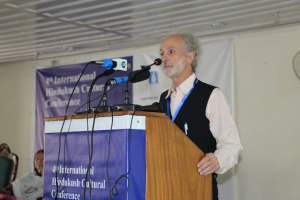
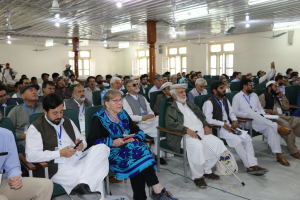

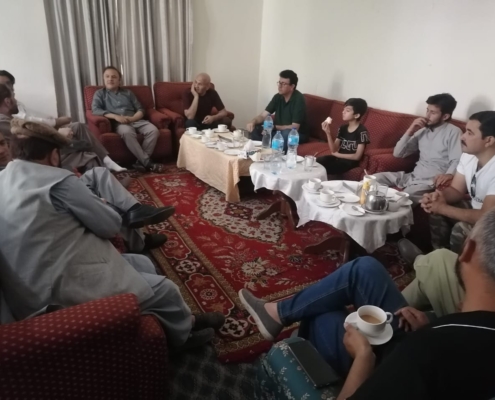
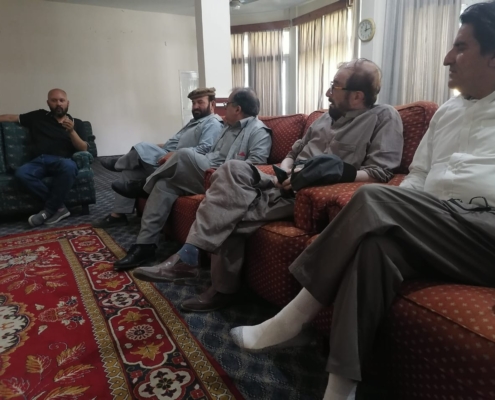 The Gilgit Baltistan Legislative Assembly has passed multiple resolutions in the recent past, urging the local government to take initiatives for the development of indigenous languages spoken in Gilgit Baltistan (GB). In response, the GB Government enacted an act in 2017-18 to establish an academy for the promotion of these languages and allocated a substantial budget. However, the implementation faced obstacles, primarily due to lack of pursuit from language enthusiasts.
The Gilgit Baltistan Legislative Assembly has passed multiple resolutions in the recent past, urging the local government to take initiatives for the development of indigenous languages spoken in Gilgit Baltistan (GB). In response, the GB Government enacted an act in 2017-18 to establish an academy for the promotion of these languages and allocated a substantial budget. However, the implementation faced obstacles, primarily due to lack of pursuit from language enthusiasts.






